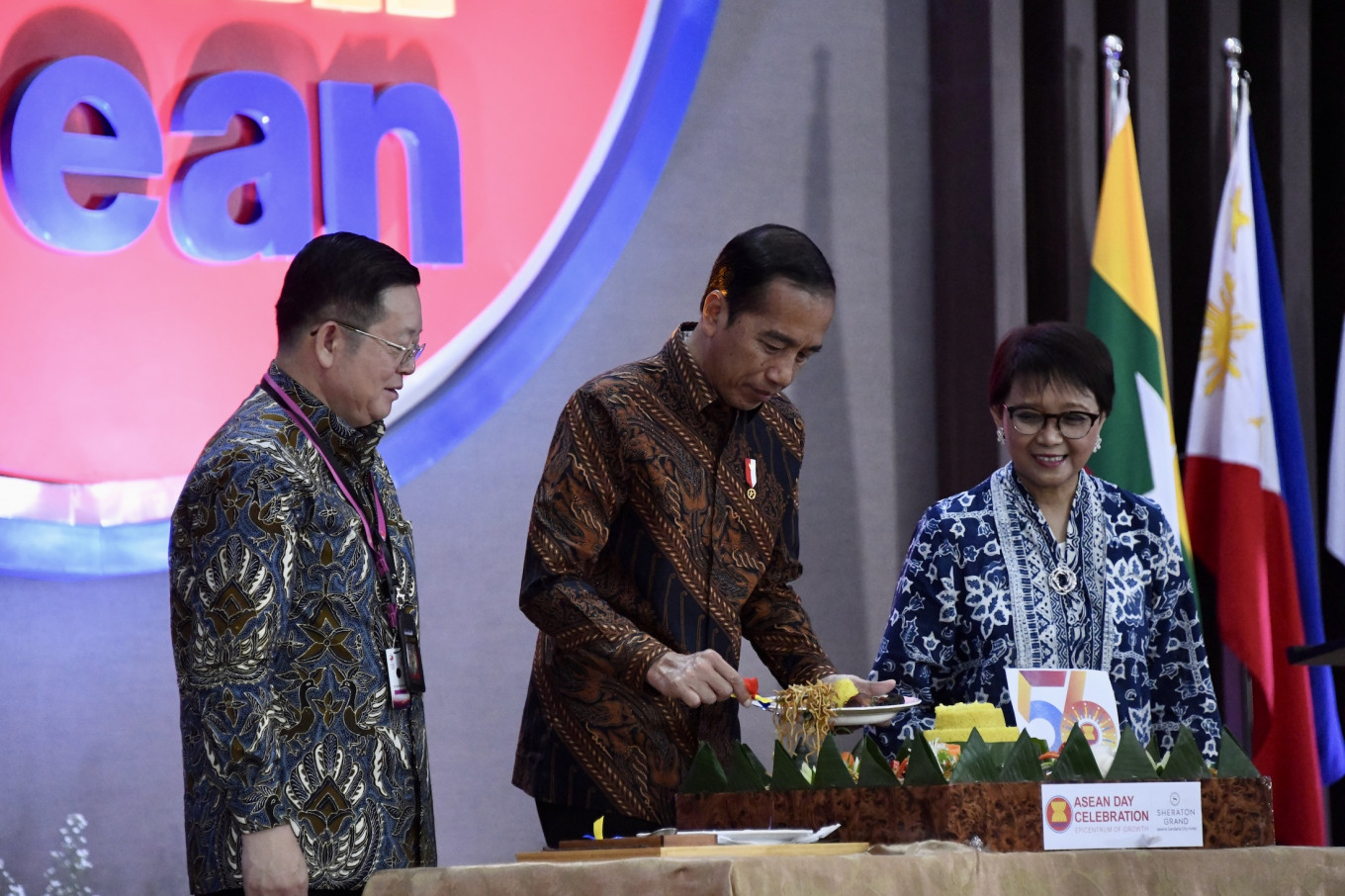Popular Reads
Top Results
Can't find what you're looking for?
View all search resultsPopular Reads
Top Results
Can't find what you're looking for?
View all search resultsASEAN not ‘people-centric’ enough, civil society finds
Analysts say that many issues are left unanswered by ASEAN despite its significance to the 600 million people living in Southeast Asia.
Change text size
Gift Premium Articles
to Anyone
A
SEAN has always prided itself on striving to become a “people-oriented organization”, which underpins much of the work that has benefited ordinary Southeast Asians through improved physical, commercial and digital connectivity.
However, academia and civil society groups claiming to represent these very same people say that the man on the street shares little affinity with the association in Jakarta, partly because many of its programs have no immediate impact on or directly involve the region’s populace.
Most ASEAN activities and outcome documents, for instance, focus primarily on planning or capacity building instead of looking to solve problems by involving people, said Dinna Prapto Raharja, founder of the Synergy Policies think tank and a former representative of Indonesia to ASEAN’s human rights body the AICHR.
“If active participation is included in ASEAN by design, then the people should be involved from the start, not just at the end of processes, only to be asked for additional input,” she said on the margins of a discussion in Jakarta on how ASEAN can matter to its people, on Wednesday.
Many of the issues that are important to the ordinary person also tend to get left out, despite their potential contribution to the economy of ASEAN member states.
The protection of migrant workers, for instance, fits this mold, according to Migrant Care executive director Wahyu Susilo. But in spite of its significance, countries from the region still hold vastly differing views on the issue, he said.
Wahyu points to a gap between sending states such as Indonesia and the Philippines and receiving states like Singapore, Brunei, Malaysia and Thailand.
According to World Bank figures, around 8 percent of migrant workers originate from Southeast Asia, while 4 percent of the world’s migrant population are hosted there.
The majority of migrant workers are less-educated and employed in lower-skilled occupations in receiving states, which Wahyu notes has forced them to compete in a race to the bottom in already highly competitive job markets.
Meanwhile, blue-collar workers such as those employed in domestic work, on plantations or in construction and the transportation sector are still left out from ASEAN’s skilled labor mechanisms, such as the mutual recognition arrangements that primarily benefit white-collar workers.
“There are many problems relating to migrant workers that are still left unresolved,” Wahyu said in the discussion.
Women in mind
Other issues like violence against women and children are ultimately lacking in implementation, even though the bloc has made some strides in gender issues, said Rena Herdiyani, the executive director of Kalyanamitra, a women’s rights group.
“We have not seen any concrete mechanisms at the regional level that help in reporting and handling cases of violence against women and children,” Rena said during Wednesday’s discussion.
She noted that gender issues had become much more complex and cross-cutting but still get shoehorned into the category of socio-cultural issues, despite also being related to the economic and political-security pillars of ASEAN.
Meanwhile, there is also a significant gap between policies made at the regional level and the needs of people at the grassroots level. This is particularly true for women who know nothing about ASEAN and the impacts that its policies have on women, Rena added.
“ASEAN should do more to listen to people at the grass roots, so the policies that it makes address their needs instead of creating new problems,” she said.
In Southeast Asia, on average, a quarter of all women have suffered physical and/or sexual violence at the hands of an intimate partner at least once in their lifetime in the nine countries where data is available, according a 2021 report by the Organization for Economic Cooperation and Development’s (OECD).
Violence, or the fear of it, the study found, can prevent women from pursuing education, working, earning an income, making decisions about their health or their children’s education and exercising their political rights and voice.
People’s voice
Despite its best efforts to serve its large population, ASEAN has often been accused of inhabiting an ivory tower, conducting activities that rarely benefit the ordinary person. People with knowledge of the processes have said that this is often true in part due to the limits that regional processes can have on individual countries and their peoples.
One of the frequent workarounds that ASEAN officials have espoused is by leaning into economic growth.
President Joko “Jokowi” Widodo’s focus for the Indonesian chairmanship of ASEAN this year has been to strengthen the 10-nation bloc as an economic community. On the 56th anniversary of ASEAN on Tuesday, he likened the regional grouping to a big ship that must not be allowed to sink so as to carry its peoples toward better lives.
That same day, ASEAN Secretary-General Kao Kim Hourn said the region’s 600 million people remained at the heart of the bloc’s priorities, and that its success should be measured by the “real, concrete and tangible benefits” that its people receive.
However, according to 2023 State of Southeast Asia study by the ISEAS-Yusof ISEAK Institute, nearly half of 1,308 respondents say that they felt ASEAN remains elitist and disconnected from the ordinary person, up from 39 percent in the 2022 edition of the report.
An earlier study by the ASEAN Secretariat in 2018 of 3,900 people found that only 42 percent of the general public identified “very much” as an ASEAN citizen, with 38 percent saying “somewhat”, 14 percent saying “a little” and 6 percent saying they did not identify at all as a citizen. (tjs)










